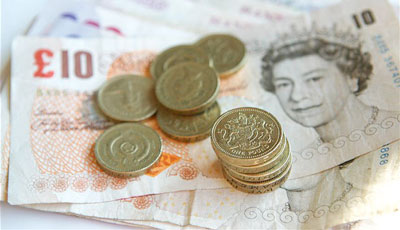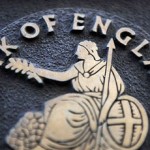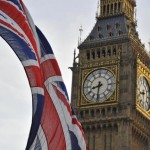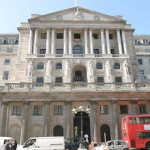Pound Falls a Fourth Day as Carney Signals Disinflation Risks

The pound fell for a fourth day against the dollar, approaching a 14-month low, as Bank of England Governor Mark Carney and Chief Economist Andy Haldane signaled they’re concerned that inflation is slowing.
U.K. government bonds rose along with Treasuries, pushing 10-year gilt yields to the least in a month, as demand for haven assets increased after data showed Japan unexpectedly sank into recession last quarter. Carney said in an interview with The Australian newspaper that the U.K. has “huge disinflationary forces coming” from its trade partners. The BOE cut its growth forecasts last week in its quarterly Inflation Report.
“The market is building up short sterling positions inspired by a dovish reading on the Inflation Report,” said Jane Foley, a senior foreign-exchange strategist at Rabobank International in London. “Carney and Haldane have made it clear they are focused on disinflationary risks.” A short position is an investment that profits when an asset’s price falls.
The pound fell 0.2 percent to $1.5640 as of 3:13 p.m. London time, after reaching $1.5593 on Nov. 14, the least since Sept. 6, 2013. Sterling strengthened 0.3 percent to 79.69 pence per euro, rebounding from 80.03 pence earlier, the weakest level since Oct. 16.
Sterling dropped 1.9 percent in the past week, the worst performer among 10 developed-nation currencies, according to Bloomberg Correlation-Weighted Indexes, as investors scaled back expectations for higher U.K. interest rates.
BOE Outlook
Haldane said in a speech published yesterday he’s watching economic developments “like a dove.” Carney and Haldane’s comments came days after the BOE lowered its U.K. growth and inflation forecast because of “moribund” global expansion and stagnation in Europe.
Japan’s gross domestic product shrank an annualized 1.6 percent in three months through September, a second straight drop which matched the textbook definition of a recession, according to the latest data. While a report last week showed the euro-area economy grew faster than economists forecast in the third quarter, analysts said the recovery remained fragile as Italy was still mired in recession.
“The BOE is clearly in no hurry to raise interest rates, given downside risks posed by some of the country’s trade partners,” said Nick Stamenkovic, a senior fixed-income strategist at broker RIA Capital Markets Ltd. in Edinburgh. “A surprise fall in Japanese third-quarter GDP spooked risk markets, supporting core government bonds, including gilts.”
Yields Fall
The 10-year gilt yield was little changed at 2.11 percent after touching 2.08 percent, the lowest since Oct. 16. The price of the 2.75 percent bond due in September 2024 was 105.585 percent of face value. Treasury 10-year note yields rose one basis point to 2.33 percent.
Gilts also gained before data tomorrow that analysts forecast will show the U.K. inflation rate stayed near a five-year low last month.
Britain’s government bonds have outperformed their German and U.S. counterparts as the deteriorating outlook for the U.K.’s trading partners, especially the euro area, weighs on its economy. That has bolstered speculation the Bank of England will keep its benchmark interest rate at a record-low 0.5 percent for longer despite the U.K. being the fastest-growing economy in the Group of Seven nations.
Gilts earned 10 percent this year through Nov. 14, according to Bloomberg World Bond Indexes. German securities returned 8.4 percent and U.S. Treasuries 5.1 percent.
Source: Bloomberg – Pound Falls a Fourth Day as Carney Signals Disinflation Risks





























